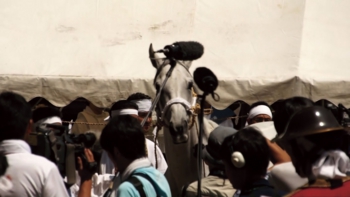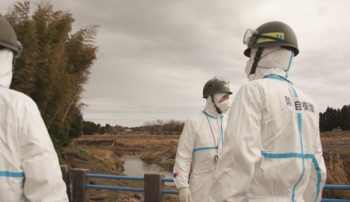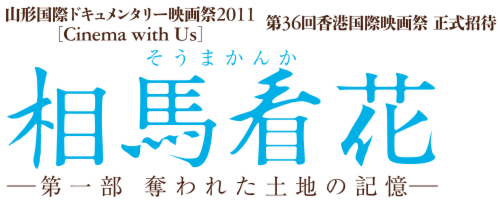FUKUSHIMA: Memories of the Lost Landscape
Title in Japanese:
相馬看花 第一部 奪われた土地の記憶
(Soma kanka Daiichibu Ubawareta tochino kioku)
Director, Camera, Editor: MATSUBAYASHI Yojyu
Sound: NAKAGAWA Kyuya
Production: 3JoMa Film Distribution: TOFOO.LLC
JAPAN / 2011 / Japanese / Color / HD / 109 min


The Enei district of Minami Soma town lies within the 20 km exclusion site of the Fukushima Daiichi Nuclear Power Plant. In early April 2011, immediately after the devastating tsunami and nuclear meltdown forced people to evacuate the area, filmmaker Matsubayashi rushed here with relief goods. From a chance meeting with city councilor Tanaka Kyoko, he begins making this film. Living together with the evacuees in school classrooms designated as temporary evacuation sites, he captures an extraordinary time period in the lives of the local people, in the aftermath of the Fukushima nuclear disaster. Interspersed with humorous episodes and loving emotions, the film delves into memories of a local culture that has been taken away by the tragedy. The cherry blossoms of April 2011 were as beautiful as ever.
Invited to:
Yamagata International Documentary Film Festival 2011
Hong Kong International Film Festival 2012
Nippon Connection 2012 (Frankfurt) and others
Director: MATSUBAYASHI Yojyu
Born in 1979 in Fukuoka, Japan. From 1999, he went backpacking throughout Asia, traveling from Shanghai to Istanbul and after coming back to Japan, entered the Japan Academy of Moving Images to study documentary. In 2002, Matsubayashi directed Hataraku hito bito he (For Those Who Work), his first documentary film on the labor movement of the Miike coalmines. In 2004, he directed Haikei Ningen sama (Dear Respectful Humans), a documentary film on a homeless man in Shinjuku, Tokyo as his graduation project and started his career as assistant director at a TV production company.
In November 2006, Matsubayashi started a documentary project on the former Japanese soldiers in Thai-Burmese border area. In 2009 it was completed as the documentary Hana to Heitai (Flowers and Troops) and released theatrically in Tokyo and across Japan. The film was acclaimed and received “Yamaji Fumiko Film Prize” and “Tahara Soichiro Non-fiction Prize.”
Recently, he had been filming water issues in Hachijo Island, a southern island of Tokyo, until the East Japan Earthquake spurred him to Fukushima. Matsubayashi has also done a number of news coverage and reportages for Japanese television, including elections in Afghanistan (2005) and the Free Ache Movement in Indonesia (2006).
His first feature documentary after the 311 tsunami and nuclear disaster Fukushima: Memories of the Lost Landscape has been invited to the Hong Kong International Film Festival 2012, and other acclaimed film festivals like Yamagata International Documentary Film Festival 2011. It will be theatrically released in May 2012 across Japan. He is in production of a second film about Fukushima.
Contact:
TOFOO.LLC
#306 Shinjuku Q Flat Bldg., 5-4-1 Shinjuku Shinjuku-ward 1600022 Tokyo JAPAN
Tel: +81-(0)3-5919-1542 FAX: +81-(0)3-5919-1543
E-mail:info@tongpoo-films.jp
http://tongpoo-films.jp


